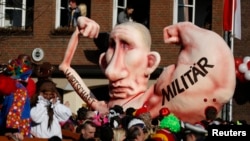A new report says the European Union “sleepwalked” into the current crisis in Ukraine, because of “catastrophic misreading” of the mood in Russia. Regional analysts say unless Brussels takes a more pragmatic view of the Kremlin’s agenda, tensions between Europe and Russia will only increase.
Lord Tugendhat, chairman of the British parliamentary committee that published the report, says Europe didn’t fully understand the extent of Russian hostility toward plans between the EU and Ukraine to form closer economic ties.
“On the European side, there was a certain lack of sensitivity about the implications, as far as the Russians would see them, of the trade talks we were entering into,” says Tugendhat.
Brussels opened talks with Ukraine in 2013 aimed at liberalizing trade between Europe and Ukraine. Moscow said the influx of EU goods to Ukraine would ruin many Russian producers, because of the close economic ties between the two countries.
The crisis began when Ukraine’s then-leader, president Viktor Yanukovych, gave up on an EU agreement, in favor of strengthening ties with Russia. That led to widespread protests in Ukraine, which eventually forced him out of office. Shortly after that, Russia annexed Ukraine’s Crimea and pro-Russian militias began fighting to seize territory in eastern Ukraine.
Last week, a cease-fire agreement was reached in Minsk, although fighting continues in eastern Ukraine.
False reading of Russia
Sam Greene, director of the Russia Institute at King’s College London, says tensions between Russia and the EU will not be resolved, regardless of the outcome of the peace process.
"Coming to a cease-fire and a resolution [on the frontlines] is not going to solve the contradictions that Europe has with Russia. There is going to need to be a much longer and more strategic process of creating a new basis for a new relationship," says Greene.
He says since the end of the Cold War, Europe has incorrectly assumed that Russia has been on the road to democracy, capitalism, and liberalism. Member states have failed to reappraise the relationship and to adapt to the realities inside Russia.
Greene says if the European Union does not believe it can bring change in Russia, it will have to realize there is going to be competition with Russia, and that competition will need to be carefully managed.
“The reality is that Russia saw the EU as a geopolitical threat and acted on that perception in Ukraine, and Europe has to come to terms with that,” says Greene.
Margot Light, an expert on Russia at the London School of Economics, says the committee's report may have little effect on the crisis in Ukraine. But, she says, it’s an important shift, and could begin a longer-term process of better understanding between Europe and Russia, even though Russia’s President Vladimir Putin has a reputation for being unpredictable.
“They ought to understand better that what he tends to do is dig his heels in when punitive tone or punitive measures are adopted against him. One doesn't need to understand Putin, one only needs to observe his behavior to see that,” says Light.
The report recommended that the EU should renew and tighten sanctions against Russia in the short term if there is no progress on the Minsk Protocol and the situation in eastern Ukraine continues to deteriorate.




